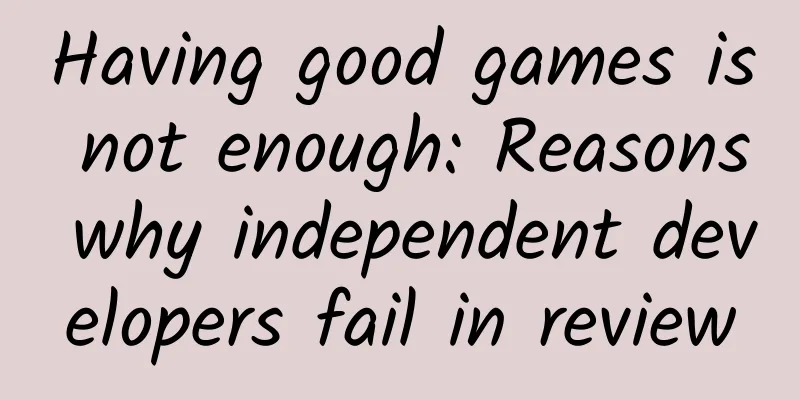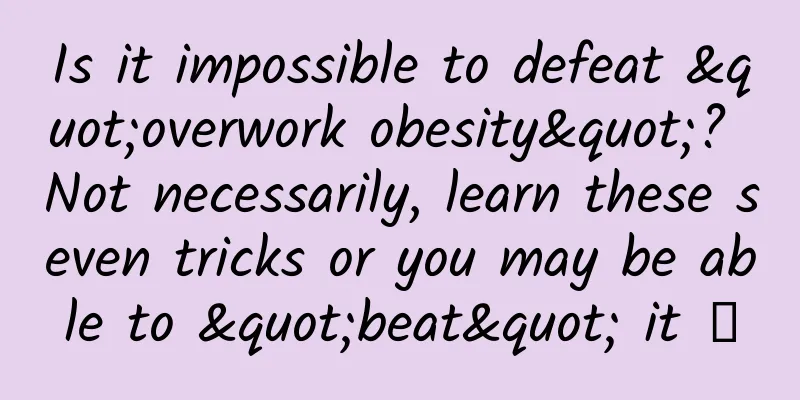Having good games is not enough: Reasons why independent developers fail in review

|
For independent developers, it is becoming increasingly difficult to create a "dark horse" product. Some people think that it is because the quality of the game itself is not high enough, while others think that it is because of insufficient marketing expenses. However, it seems that this cannot be the only reason for the failure of a game. For example, an independent developer named Daniel West recently said in a blog that the independent game he and a student team created in their spare time for 3 and a half years received about 80% positive reviews and had good marketing promotion, but it still ended in failure, and sales have dropped to 0 copies per day. This news has caused a heated discussion among independent developers in Europe and the United States. Is it enough to "make a good game" and "carry out a lot of marketing promotion"? Why did Daniel West's independent game "Airscape: The Fall of Gravity" fail even though it met these two conditions? For the past three and a half years, I have been working on an independent game called "Airscape: The Fall of Gravity" with a group of students. We worked on it part-time most of the time, and I spent about a year working on it full-time in the middle of the game's development. As a quick introduction, Airscape is a 2D action-platformer about a deep-sea octopus that's abducted by aliens and left to its own devices to survive in a crazy, gravity-distorted world full of dangerous hostile robots.
Airscape has won several awards, including the PAX Australia Indie Showcase and Intel Level Up competition, and we have shown the game at Indie MEGABOOTH three times and at many trade shows. Finally, Airscape is available on Steam and was listed on the Humble Store three weeks ago. As the number of reviews increases, we continue to have a positive rate between 70-80%, and currently has a Metacritic score of 75%, which is very good for a first game made by a student team. Airscape was a commercial failure, though. In fact, I don't think I've heard of any other game that sold worse on Steam than ours. Of course, I'm sure there are games that sold worse than ours, but I haven't heard of them. So far, our game has actually sold less than 150 copies across all channels combined, and although this is probably only about 10% of lifetime sales, even if we end up selling 1,500 copies, it's still very poor, because in this case we're just able to break even on PR costs, not to mention R&D costs (which took us more than 3 years). Fortunately, none of our team planned to make a living from this game, so we wouldn't go hungry because of making this game. So why did Airscape fail so miserably? Like most indie games, the reasons are complex, and I still don't claim to know all the real reasons, but I will do my best to analyze the past, and I think it will be meaningful to other developers who hope to release indie games on the PC platform. Marketing At the beginning of Airscape development, I realized that marketing would play a huge role if the game was to be successful. I really listened to every guidance, asked for advice and did a great job marketing an indie PC game. We did a lot of press since the release at major events, such as GDC, PAX East, Prime, Aus, and basically contacted every media outlet I could get my hands on. I even met with people who weren't interested, and while that was disappointing at first, I realized that without anything to offer, like a game or a Kickstarter page, I couldn't expect much media attention. Even so, I did my best to promote the game in the 2.5 years between announcement and release, and here's a breakdown of my marketing efforts for Airscape during that time: Marketing email screenshots Personal emails to the press whenever there was legitimate news, announcements, new trailers, trade show appearances, etc. We exhibited at several events around the world, like GDC, PAX East, PAX Prime, PAX Aus, Denver Comic-Con, etc. We submitted the game to multiple award programs, winning 2. I've been very active on social media, with a half-good-looking website, a presskit, and news about the game on Reddit, forums, etc. As we got closer to the release date, I decided that the smartest thing to do would probably be to hire a professional PR company (obviously with a lot of indie experience) to promote the game. I knew I didn't know everything about PR, so I turned it over to a company that really understood the area, and I invested a considerable amount of money in it just to ensure that the marketing was successful during the critical release period. Youtube anchor promotion When the release period was over, we were once again disappointed to find that almost all mainstream media, anchors, and reporters had lost interest. There were some notable exceptions, but overall, the release period was over, and many gaming media just didn't know that our game was released, and I don't think the PR company we hired had any failures, which I will talk about later. The reviews for this game are almost all positive, and of course, some people think that a good game will naturally find people who love it, especially when some important games are released, appearing on the front page will make a big difference. However, this is not the case. Our data shows that the game does not bring many sales when it is on the front page, and it does not have a particularly good effect when it is on the front page of the Humble Store for many days. The reason will be mentioned soon. At this point, I can say that the game's sales failure had nothing to do with marketing. The media did a lot of promotion for us, and I am very grateful to the PR company for their efforts to get our game on the front page. In fact, I heard feedback from many larger media that if they hadn't hired a PR company, they would not even write a review for the game. As mentioned before, the game releases were not very frequent at the time, so I think it is wrong to attribute it to the wrong release time.
Game promotional image About a week after its release, sales quickly dropped to only about one copy per day, and have now dropped to zero. Problems with the game itself Now, let's look at the game itself, because, after all, maybe the answer is simple: what if Airscape is just garbage? If you read the reviews of our game, you will find that this game is not bad. As we mentioned before, the praise rate of "Airscape" is about 70-80%. The praise comes from many aspects, such as the excellent art style, beautiful music and innovative gravity offset gameplay. One negative comment is that some players feel dizzy from the constant camera changes, and the difficulty of the game changes too suddenly, rather than the whole game being particularly difficult. This is actually what every game designer wants to do, but I think there may be some reasons why reviewers did not praise the difficulty of the game, including that we deliberately made unfair settings in some places. Game review screenshots So overall, we made a good game and did a great job marketing it, but what went wrong? Then there may be only one answer, that is, we made a game that no one wants to buy. This may sound exaggerated, I strongly believe that there is a potential audience for this game and they absolutely love it, in fact, a few people bought this game and commented that they bought a terrible game, and some even said it was their favorite game of the year. However, despite these positive reviews, this game does not have much appeal to the mass market. I have seen games like Super Meat Boy, Hotline Miami and Nuclear Throne, which are relatively difficult games, so I think there is a big market for difficult games. My mistake was that I regarded these games as the majority of games, which is not the case. We may also have had issues with our marketing capabilities, most fundamentally the separation of art from gameplay. Cute, attractive octopuses, orchestral music, and cozy colors were all intended to make the game unique and fun, but alienated the user base we were hoping to attract. We were in a downward spiral of failure because we made a game that no one wanted to buy. When you make a game, there are usually expectations that some well-meaning journalists or YouTubers will be interested in a certain game, but overall, the media wants clicks, and if your game is popular, it is beneficial to both parties because they can also get more clicks.
The game is good, but maybe not good enough to stand out So here's the time to mention the strategy we adopted, which I think can be called the 'saturation strategy'. We hope that everyone and his mother will hear about our game, and then let those who are interested buy the game. However, there is another way to market a game, which is the 'community way', which is to first accept that not everyone will like your game, so focus on building a core community, get exclusive fans, and then let it grow naturally. This is useful for many games, even some games you haven't heard of, but because of the number of users, not many people know it. Although this lesson is cruel, it is beneficial to us. The community model may be more suitable for Airscape, but it requires a considerable number of users at the beginning, and we need to keep updating based on feedback. But I think Early Access or Kickstarter are not suitable for our game, because the fun of this game is that you never know when the game will end, so we don't need Kickstarter or fundraising, so we chose the saturation model. Core Issues Once again, these are the core issues: the game is a good game, the marketing is decent, but the sales are terrible, which I think is what you should expect in 2015. It seems like sometimes you do everything right and you're sure it will succeed, but when you talk about the game not meeting expectations, these ideas disappear. More often than not, you'll see games fail because the development team was misled and thought that if they went to more trade shows, sent emails to more journalists or had more Youtube anchors promote it, they would have succeeded. However, I found the opposite to be true: if you just do everything right, then it seems impossible for you not to succeed. A successful game needs that magical element, that undefinable factor that turns a good game into something special. Why would anyone want to try a good game after a magical game has come out? The only answer is, my game is unique. However, if not enough users are interested in your unique content, then the game will eventually fail because most people don't care. So, if you just make a good game, it is far from enough. There are too many good games on the market, and the frequency of good games being launched is accelerating. Consumers have too many options, and there are many good and great games. Having an excellent marketing strategy is not enough, because every day there are more games that invest more marketing funds than you. In my opinion, to be successful you need three things: a great game, a really great marketing strategy, and really good luck. So far, I haven't seen any unexpected situations happen. The biggest change recently is that the standards for good games are constantly improving, and it is even difficult to achieve the above three elements. If your game does not have even one of them, it is very likely to fail and will quickly lose media attention. Of course, the standards for excellent games are changing and difficult to determine. After all, every game has certain strengths in certain aspects. But there is no need to continue discussing this issue because the standards are inconsistent, and I understand that myself. So, what do I mean by saying all this? First of all, it is wrong to regard the performance of a game as the trend of the game industry in the next few years. Please regard a successful game as a simple data. In other words, I will try my best to summarize the overall lesson I learned from the failure of "Airscape". Steam hasn't benefited from independent games for a long time. In addition to the simple expectation problem, game developers can no longer rely on the simple success rules of the past. A good, well-marketed game may not necessarily succeed on the Steam platform now. Whether you are willing to accept it or not, Steam has become the App Store, and the proportion of free games may not be that large. Some people may think that Steam is an early App Store, and bidding strategies will appear sooner or later in the future. But I personally don't think so. Independent developers will not compromise on low prices. A very low barrier to entry ensures that a few games are released every month that are good, and as a direct result, it is difficult to make a unique game. The definitions of a good game, marketing, and luck are constantly changing, and the cost of standing out is becoming more and more expensive. I have lost confidence that I can make a living making an independent game. I never bet everything on it, but I often just feel that the risk is not worth it. I can't help making games, so I will continue to make them in my spare time, but I don't really expect my independent games to be a huge success. I also hope that these conclusions are wrong. I also hope that the failure of "Airscape" is not due to a general trend. Indie development is very prosperous, and I am proud to be a part of it. I think independent games will definitely exist. I just hope that most developers don't have such a heavy psychological burden. |
<<: Apple releases first iOS 9.1 beta to public beta users
>>: 5 Lessons a 19-Year-Old Programmer Learned at Google
Recommend
What are the things to pay attention to when recruiting app developers?
Recruitment is a difficult task for many companie...
In 2021, the total shipments of mobile phones in the domestic market reached 351 million units, of which 5G mobile phones accounted for about 76%.
According to data released by the China Academy o...
Simple but not simple DingDong smart speaker review
DingDong smart speaker is the first smart product...
A complete guide to information flow optimization. Are you still worried about conversion after reading this?
Conversion is the core of bidders, so what is the...
A feasible solution for adding fans in private domain!
More and more people realize that private domain ...
C4D Zero-Based Introductory Course
This course is designed for students with no basic...
Observation on Brazil's new energy vehicle industry: small scale but fast growth, Chinese manufacturers have an absolute advantage
In the past few years, the global new energy vehi...
miāo miáo miǎo miào…Does your cat speak dialect?
Audit expert: Wu Lei National licensed veterinari...
Kingdee Cloud Developer Conference: Mobile work platform ushered in a year of explosive growth
From January 15th to 16th, the first Kingdee Clou...
Low cost and high activity, how to recall users?
What I will talk about today is mainly related to...
How did humans learn to count?
Author: The Nutcracker Studio To this day, we sti...
What should I do if the Baidu index volume drops significantly? How to quickly restore the index volume?
Dongguan Fengchao 's index volume has dropped...
What did the ancients do if they were nearsighted? Did they wear glasses?
In recent years, myopia has become younger - acco...
Zhou Lvwen-Learn mathematical modeling and MATLAB programming in 7 days
This course requires a certain foundation, otherw...
"Treasure Hunt" on China's Water Tower! How powerful is China's "plateau drilling"?
Drilling is one of the most direct and indispensa...









